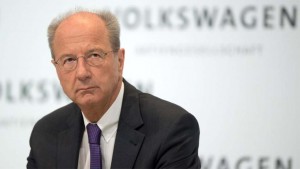
VW Chairman Hans Dieter Poetisch denies having knowledge of the scope of the diesel cheating scandal
Volkswagen officials are denying reports that Chairman Hans Dieter Poetsch knew about the diesel emissions cheating allegations before they were revealed by U.S. authorities in September 2015.
German newspaper Bild am Sonntag reported that Poetsch found out about the carmaker’s violations of the rules in late June 2015. He was Volkswagen’s head of finance at that time. The company was led by Martin Winterkorn, who later resigned due to the scandal.
The paper cites a confidential presentation from the VW legal department, which was made available to investigators handling alleged market manipulation. One of the investigations centered on VW is if executives acted quickly enough and if not, was it done to manipulate the company’s value.
The newspaper claims that Poetsche reviewed a presentation dubbed “Sacramento” dated June 24, 2015, which said the company was violating U.S. emissions rules and the company may also have breached its supervisory obligations.
(VW back in global sales lead, Toyota back to No. 2. Click Here for the story.)
According to testimony from a leading VW lawyer, referred to as “witness P.”, he saw the presentation on June 29, 2015. He was also informed then that 600,000 vehicles in the U.S. were affected and that the financial risk for VW stood at 35 billion euros, or $39.8 billion, Reuters reported.
Volkswagen has been aware of the allegations for some time, the company noted in a statement. Additionally, the brewing diesel scandal was the topic of many discussions with Poetsch in the summer of 2015, Volkswagen said.
“However, none of these discussions had the content and quality which could have made capital markets law relevant for Mr. Poetsch,” the company noted.
(Click Here for more about German automakers enduring more diesel-related scrutiny.)
Volkswagen officials added that until the publication of the Notice of Violation by the U.S. authorities on Sept. 18, 2015 it did not have sufficiently concrete indication of a situation that could be share price sensitive. Poetsch became chairman shortly after the scandal broke publicly.
In the German market manipulation lawsuit, plaintiffs claim VW failed in its duty to inform investors about the potential financial implications of the emissions test cheating, which has cost the company more than $30 billion in fees, penalties and fines.
(Investor suit against VW AG gets underway. Click Here for the story.)
The company has argued it did not inform investors of the issue because it did not want to endanger the chance of reaching a settlement with the U.S. authorities, Reuters reported.
